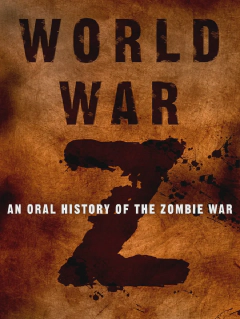
World War Z
- Publisher:
- CROWN
- Released:
- 2006
- ISBN-13:
- 978-0-307-35193-7
It’s over. The global war against the Zombies is won. Tasked with creating an account of humanities struggle, a journalist travels the globe and interviews contemporary figures who where there when it happened.
The book makes it clear in its opening paragraphs that there is no dramatic question about whether humanity will survive the war. Set about ten years after its conclusion, characters recall their stories with the benefit of hindsight. All interviews are presented in chronological order to give the overall story a familiar structure. It manages to not undermine its suspense by presenting most chapters as standalone short stories with their own dramatic arc’s. These stories are then tied together in the same universe by common events and people referenced across other stories.
This is where the book shines. Some chapters have enough interesting ideas to sustain a short movie on their own. What elevates them further is the great world building that they do. Events are usually described with a lot of context but just enough left unsaid to tickle your imagination. It paints some great pictures, but somehow the really incredible stuff always seemed to happen just off-screen, in my own head.
On top of this, it has some great genre ideas. The way the plight spreads to the rich first world nations through illegally harvested organs. How the modern military with all its machines of war is fundamentally ill-equipped to fight what isn’t human (anymore). I have consumed plenty of Zombie media out there, none of it has tackled these concepts with as much thought as this book.
There is a good measure of societal criticism and environmentalism in the book. Most of it is subtle as a sledgehammer, because the characters through which these themes are explored often feel like caricatures. At its heart, it’s a story about human ingenuity and endurance. About our nature to overcome. “If we could all just come together against a common enemy” it says. While cheesy, in this way it finds hope in its bleak depiction of its bleak subject.